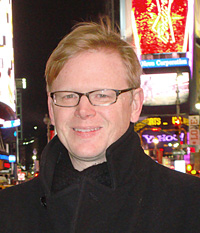Is the medium still the message?
Marshall McLuhan: oracle, or merely master of the pithy quote? The Canadian media scholar took the world by storm in the 1960s and 1970s with his enigmatic writing style and seductive predictions for the future of man and media. He had a resurgence in popularity when Wired magazine named him its patron saint in the early 1990s.
Even with the 100th anniversary of his birth this year, his observations remain apropos in our world of electronic media, and scholars the world over continue to study his theories. But how do they really play today?

Charles Acland, professor and Concordia University Research Chair in Communication Studies, explains McLuhan’s endurance in the popular imagination. “The interesting thing about the McLuhan legacy is that a lot of his career, especially the high point in the ’60s and ’70s, was very much geared to a sense of his own legacy and impact and his own stardom.”

It’s not really surprising that this student of advertising was engaging then in what we now call building a personal brand.
“But along with that came criticism,” Acland points out. “He was severely attacked and roundly dismissed in the 1970s. He made sweeping claims, which on the surface may have seemed to be evocative and potentially illuminating statements, but that under examination would fall apart. So he was challenged quite a bit. But with the Internet and the World Wide Web, people have returned to [his work] to look at how he signalled the kinds of interactions and technologies we have come to live with. That’s why people are re-reading him.”
Indeed, the man who opined that “the future of the book is the blurb,” could well have been predicting Twitter. His notion, “If it works, it’s obsolete,” captures the ethos of our era of planned obsolescence. And when he said, “with telephone and TV it is not so much the message as the sender that is ‘sent,’” he could have been presaging social media. And what of his most famous line, “The medium is the message”? Is it all sizzle, no steak?

Darren Wershler, Concordia University Research Chair in Media and Contemporary Literature, does see some substance in it. “That phrase is one of the keystones of communication studies, the idea that you really have to understand how form works, not just the content,” he says. “The field of communication studies is deeply indebted to McLuhan for the idea that you need to study the material form of media to really see what is going on.”
What is beyond doubt is that McLuhan has left an indelible mark on popular culture, even if some of his ideas are no longer associated with his name. “You see versions of his ideas everywhere,” Acland says. “Whether you’re talking about ideas of global village, new forms of individualism, new forms of community space, notions of mobility … you don’t have to watch too many Apple or Cisco commercials to hear versions of those ideas reproduced.”
Both Acland and Wershler believe that McLuhan’s true legacy lies in areas that are not on the general public’s radar: ideas about opening up the classroom were taken up by educational theorists, artists and art theorists who share his interest in how to produce art in the age of multimedia, and of course communication studies and cultural studies owe him a major debt.
So whether it’s the respected scholar or the celebrity pop philosopher, we may be hearing from McLuhan for some years to come.
Related links:
• Charles Acland
• Darren Wershler
• Marshall McLuhan

